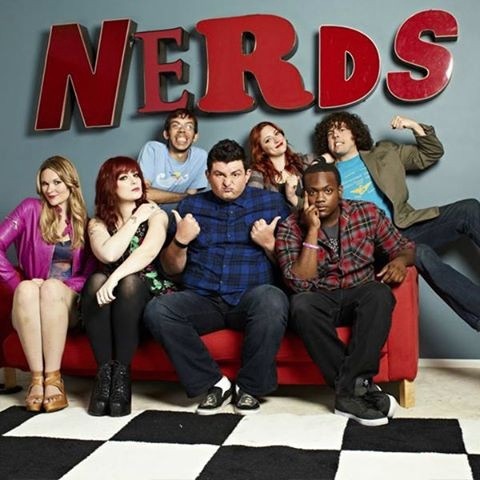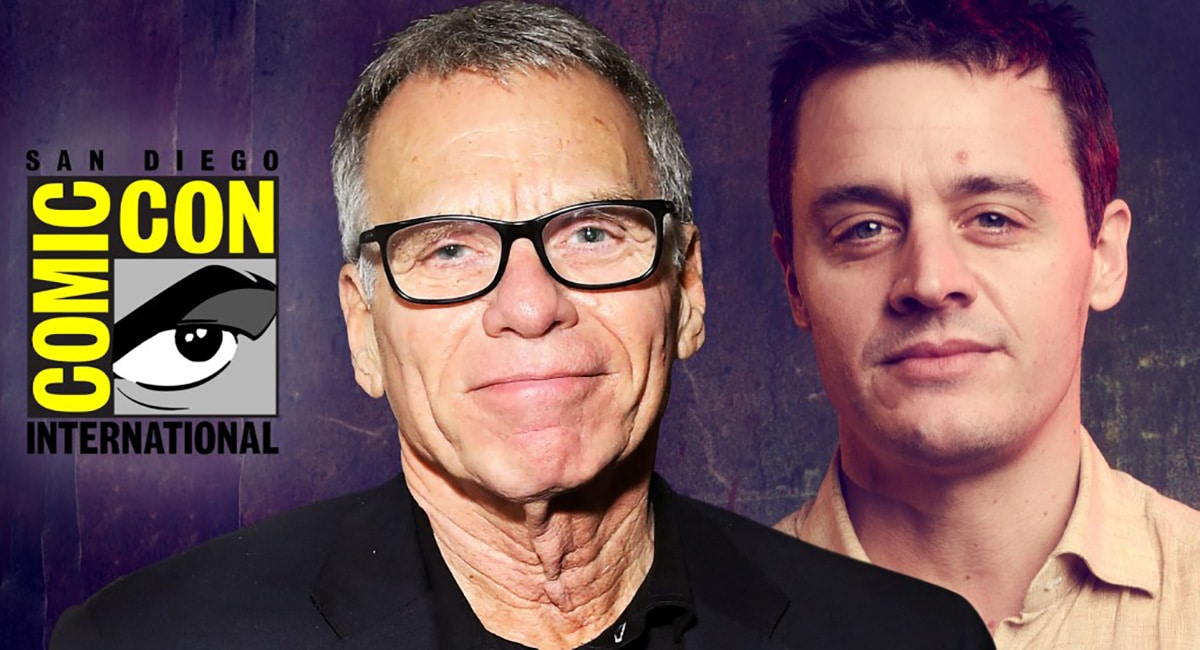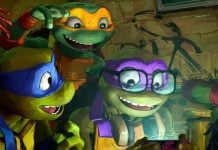Fangasm, the reality show about nerds and their amazing lives, ended its run this week with a two hour season finale. I have to confess I’ve only seen the first two episodes because life has been so hectic and we had to catch up with the Ultimate Fighter first. I’ll have a marathon at some point. But watching a third of the show gave me some idea about how I feel about the negative press the show received. Andy Khouri has a brutal beatdown at Comics Alliance that I’m sure you’ve all read by now.
I won’t join in any beatdowns, because the real problem with the show, as a reality show, is that everyone on it is so obviously a nice person. Geeks, or nerds, or smart people, or fans or whatever you want to call them, are generally nicer, smarter people than the people who were on the Jersey Shore, and smart people are way less entertaining than dumb people. So that was a fail from the start. I think what’s more interesting is the semiotics of it. Khouri, in addition to having various problems with the show’s relationship to Comikaze, the LA based pop culture convention, also dismissed the marketing of the supposed “geek tribe.”
In reality (no pun intended), what we casually refer to as “geek culture” has in the last 10+ years ascended from a derided subculture to a massive consumer class actively serviced by virtually every commercial sector in America, a fact that’s put an existential challenge to the nature of “geekdom,” particularly its claim to underdog status. That Fangasm exists at all speaks to this notion of cultural currency, but unfortunately it’s the literal currency that is the most basic and base element of the entire Fangasm enterprise, which we discover is even faker than the kinds of series — to use the reality show parlance – it throws under the bus.
Brian Hanson at Topless Robot (is that still around???) has similar thoughts and also questioned the premise.
And that’s a question I’ve been wondering since the premiere. While Heroes of Cosplay infuriated me from the get-go because of its massive misconceptions about its core concept, I’ve spent the past several weeks in a confused state of disarm just wondering what the hell Fangasm exists for, besides a Comikaze commercial. The cast themselves reminds me of nerds I knew or would hang out with when I was 24, which isn’t really a good thing. The older you get, the more you realize that having friends who can do more than simply re-enact The Trouble With Tribbles has its own benefits. And just by gauging the interest online, Fangasm hasn’t really been connecting with anyone.
Valerie D’orazio, making a welcome return to blogging, has a more nuanced take called Geek Will Eat Itself, where she nails the cycle coming to a close:
As I predicted on this blog several times over, the mainstream “Geek/Nerd Chic” aesthetic is going the way of the dodo. There has been an increasing “death warrant” for such entities over the last year; just another niche that was adopted by the mainstream media, squeezed of every last bit of “value,” and dumped on the pavement.
BTW, I never watched Heroes of Cosplay, although I hear it was horrid. The word on the street is that Fangasm’s ratings haven’t been awesome, so it’s questionable whether it will be coming back. At any rate, the somewhat subdued reaction to it has, as Valerie suggests, put a dot at the end of this whole inane idea of the “nerd” as a specific tribe or (god help us) a racial group. It’s an idea dreamed up in marketing hell, not on someone’s dream achievement list. As I’ve often noted in my own Unified Field Theory of Fandom, certain kinds of people like certain kinds of material; it is not the material that creates these personalities. It’s why idealistic young men want to be Jedi Knights, and young women puzzling over social acceptance like manga.
And finally, Chris Hardwick has his own game show now, and it’s on Comedy Central, not some channel for Nerds. The Era of The Geekist is over and only the stories and toys and movies and art that real people make and real people cry and sigh at remains. Long Live The King!








It is sad when a show like Heroes Of Cosplay get more ratings because of contrived drama. I’d rather watch a show where folks get along. — however, I’m not the demographic they’re aiming for anyway. Fangasm has the problem of a lack of narrative / goal. I think it suffers on a base level, which would hurt any show — no matter the theme or subject.
Likewise, I agree with Valerie D’orazio that the mainstream is in the process of squeezing every drop of life out of the mainstream version of comics culture. It’s just part of the curve when one is indoctrinated into mass media on this level.
I hope “nerd culture” blows up on itself and turns back into being something uncool. I’m getting sick of people that say, “I’m such a nerd,” but then know nothing to back up their claims. I know others are saying to be nice to newbies trying to get into these sort of things because comic fans should be inclusive and that having new fans will only help expand the nerd culture. But look what happens when you do that?
You get a show like Fangasm.
It twas the title of this piece that drew me in. Why do we need a “nerd culture” at all? At this point it’s just something for the PR people and soulless mainstream media pieces. I’d rather just have a nation of literacy and discerning film goers, but I might be asking to much.
The problem is that in a country with 300 million people, even a tiny percentage of those people being “nerds” is a demographic that can be targeted by marketers. Twilight nerds, Star Trek nerds, My Little Pony nerds–being intensely attached to something is correlated with being willing to spend money on it. Marketers can’t ignore that.
Author Jonathan Franzen was recently ridiculed for, in effect, lamenting the existence of the Internet and social media, and being nostalgic for the era in which releases of new novels were news-making events. The nation can’t go back to that era, fortunately, but it’s also impossible to be unaware that the country also millions of nerds.
SRS
Incidentally, Khouri’s complaint about “fake TV” in Fangasm was also my issue with Whoopi Goldberg’s piece on The View. Yes, it was positive exposure for comics, but it was also a fake and completely absurd scripted scenario with Goldberg receiving “advice” on pitching a comic that she’d never get in reality (and worse — to me — not getting across the potential risks of giving away your original creation to DC or Marvel).
As far as complaints about “nerd culture” and “fake nerds” in particular, I honestly don’t see the problem in non-nerds aspiring to be nerds. Nerds make better role models than the usual entertaining-but-dumb mainstream celebrities.
“I hope “nerd culture” blows up on itself and turns back into being something uncool. I’m getting sick of people that say, “I’m such a nerd,” but then know nothing to back up their claims.”
Of all the things I hate about nerds and geeks, it’s the sentiment in that statement that grinds my gears the most. I instantly hate anyone whose self esteem is so subterranean that they’d care whether someone know who Nick Fury was before Iron Man came out or whatever.
All “geek culture” amounts to these days is a pissing contest of who knows more about whichever subject they’ve chosen to form a myopic attachment to and the gestalt of living, breathing PR puff pieces we call fandom.
The idea that nerd culture is something to aspire to or look up to is so weird, given that it’s a culture that’s rampant with homophobia, sexism and racism, both among fans and a great deal of the content associated with it.
Looking at the people that go on shows like Fangasm and Comic Book Men I just think to myself simultaneously thanking god there were jocks beating up these people back in high-school and wishing I was the one giving them swirlies and atomic wedgies.
“can we just retire the words “nerd” and “geek” for a while?”
Well, then you’d have to stop using it, wouldn’t you? Be the change you wish to see in the world, and all that.
@ Charles
I’m not saying people have to know a lot on a certain subject but geez, at least know something.
I was at my day job and I saw this person wearing a Thunder Cats shirt. I say, “hey, nice shirt, you see the new series on Cartoon Network?” He then tells me he never saw the show, or anything really related to thunder cats. I don’t hate newbies that are trying to learn about this “geek culture” or whatever it is called, but at least make an attempt to know something. It’s like imagine you were a fan of a sucky sport team for years and all of a sudden they start winning and then everybody else hops on the bandwagon. Any die-hard sports fan would be annoyed by this and I’m no different with my passion for comics.
One problem I have with conventions right now is that there is less and less people going to buy and read comics and more are just going to see celebrities, movie premieres and video game demos. I have exhibited at conventions and would rarely see anybody carrying bags of comic books. I’ve known people who have gone to comic con and openly admit they never read a comic in their life. That is a frustrating situation for somebody like me that spends countless hours creating my own comic books. Imagine spending tons of money to get a table at a convention and a lot of the people there don’t even read comics.
Yeah, I’ll admit it is not right for me to hate people for not caring about comic books as much as I do, but I must admit, it is still really frustrating seeing people there who don’t know anything, nor even give comics a try but still have no problem pretending they like that stuff.
” He then tells me he never saw the show, or anything really related to thunder cats.”
I dunno man, that just seems so trivial and meaningless to me, even with the sports analogy.
Most nerds/geeks I’ve known are a mix of socially awkward and obsessive compulsive, with a dash of unearned arrogance and annoyingly political thrown in there. Not, in fact, very nice people and definitely not very pleasant to be around.
I also don’t understand this obsession the nerd media and community has with “fake geeks.” What’s it to you if someone is just pretending to be into something or is actually into it?
For the most part, person A being a “fake nerd” has no consequence on person B, who is a “real nerd”, I agree. But there are a few instances where it does matter. For instance, I stopped going to NYCC because of how overpacked the con has become, particularly with people/stuff that has no connection to “nerd” interests, much less comic books.
I haven’t got around to watch the show, but Molly is super rad, so I will.
@ Zach
Totally agree with that.
“The idea that nerd culture is something to aspire to or look up to is so weird, given that it’s a culture that’s rampant with homophobia, sexism and racism, both among fans and a great deal of the content associated with it.
“Looking at the people that go on shows like Fangasm and Comic Book Men I just think to myself simultaneously thanking god there were jocks beating up these people back in high-school and wishing I was the one giving them swirlies and atomic wedgies.”
So you’re more okay with physical abuse than you are with the perceived insults and thought-crimes of those who happen to be less politically correct than you.
God, this world…
@Christopher Moonlight:
“I’d rather just have a nation of literacy and discerning film goers… .”
Oh, the irony.
Dan Ahn
Get a life, dude.
“Brian Hanson at Topless Robot (is that still around???) has similar thoughts and also questioned the premise.”
Topless Robot is totally still around, I have gone there everyday for years. I come here alot too, but TR is my home. Stop by anytime you like!
I’m missing the irony I guess. Did I spell something wrong? I admit that as someone with high functioning autism and dyslexia, I have struggled with spelling all of my life (and am far improved from my early years) but I don’t believe that by any means that would make me illiterate. Please, clarify.
Come on people, let’s be nice to each other.
I totally agree with the notion that “nerd/geekery” as a culture has been rendered meaningless by the popular adoption of the internet. You can just order your nerd badge online without making the trek to a local weird book store, comic shop or game store and putting in the effort to unearth what were once hidden gems of entertainment. The same is true of other non/anti-mainstream subcultures like punk and hip hop. You don’t have to find the cool record store in the “bad” part of town. You just have to go to Hot Topic’s web site or whatever.
On the other hand, we are almost entirely talking about entertainment and consumption here. It’s not like being a fan of Batman is part of your family’s cultural identity going back a dozen generations from the Old Country and has it’s own language and ceremony. It’s action figures and shirts and comics and DVDs they’re trying to get you to buy so they can make money off of you. It’s not that deep and not worth all the angst generated over someone’s claim to be labeled a specific type of marketing demographic.
“Nerd” is the new “grunge”.
But comic cons will continue, as it celebrates whatever is popular.
One year, it might be Homestuck. Another year, Attack on Titan.
Simpsons makes way for South Park makes way for Adventure Time makes way for …
If we’re lucky, the newness plateaus, and we just “are”, like those other geeks wearing the jerseys, roleplaying in their rotisserie leagues, delving into minutiae, paying $100 for an autograph, and slabbing their collectibles.
Arguing over who’s a nerd? Why would anybody want to brand themselves a geek or a nerd? What a douche fest this has turned into.
Comments are closed.